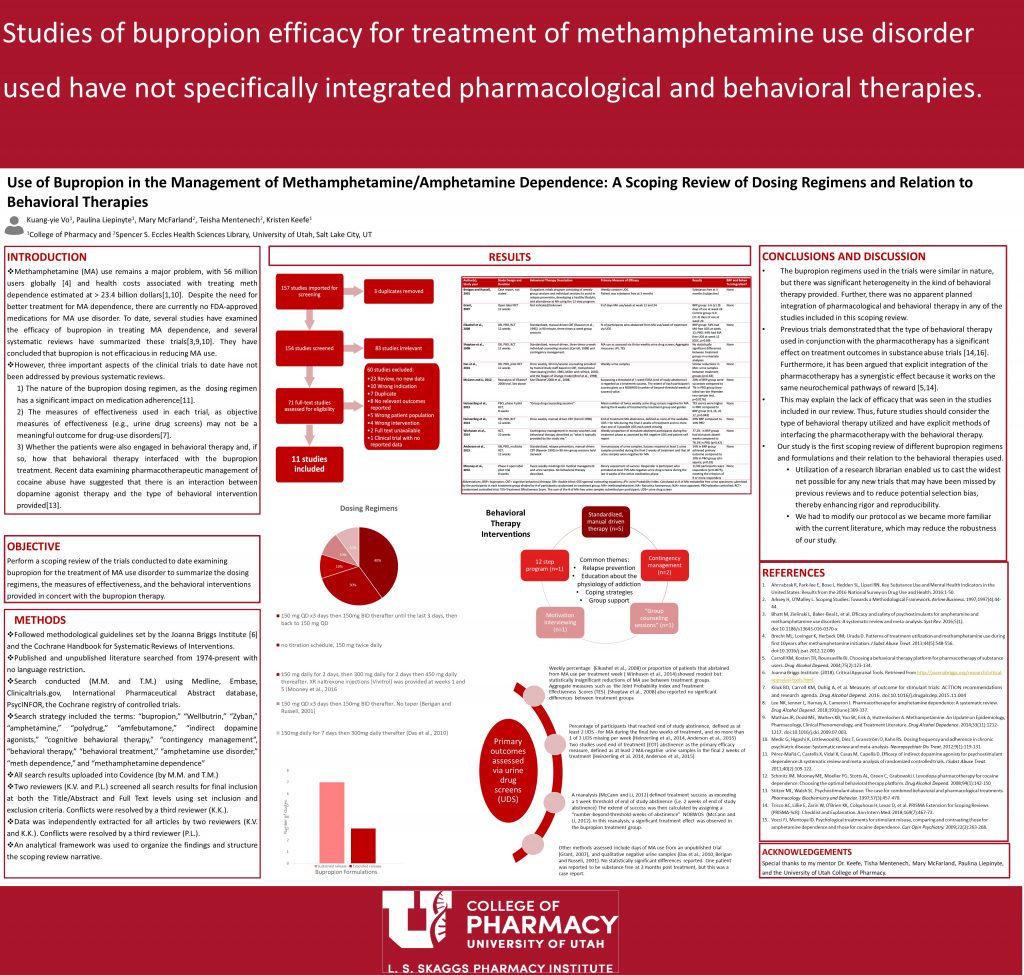Objectives: We performed a scoping review of studies examining bupropion for treatment of methamphetamine dependence to provide a comprehensive overview of dosing regimens used, behavioral interventions provided in concert with bupropion therapy, and measures of effectiveness used in individuals seeking treatment for methamphetamine dependence.
Methods: The literature search was conducted by a librarian (T.M.) in Medline, Embase, CENTRAL, Cochrane Library, PsycINFO, and International Pharmaceutical Abstracts with no language filter, and a date limit from 1974 to present. Study selection was determined by two separate reviewers (K.V, P.L.), with any discrepancies resolved by a third reviewer (K.K.). EndNote was used to manage and remove duplicate citations. Data extraction was completed independently by two reviewers (K.V., K.K.) and then compiled to address the three main questions of the review.
Results: A total of 11 studies were included in our scoping review. Of the included studies, eight were randomized controlled trials. Additionally, a majority of the studies used extended release formulations of bupropion in various titration schedules, and there was heterogeneity between the studies in the types of behavioral therapy provided. With respect to the overall objective of this scoping review, in none of the studies was there discussion of integration of the behavioral therapy with the bupropion pharmacotherapy, either in the study design or in the results and discussion sections.
Conclusions: Future studies and clinical designs should consider different methods to integrate the dosing regimen with behavioral therapy to increase medication adherence and treatment efficacy.


Well done Kuang-Yie. It really came together. I think that your conclusion is spot-on regarding the need for future studies to consider carefully how the pharmacotherapy and the behavioral therapy interface to maximize the potential of both to have positive effects.
Thank you, Dr. Keefe!
Impressive project! What an interesting application of bupropion. This is an area of clinical practice that will benefit significantly from this approach.
Thank you Chelsea!
Very nice job. I wonder if you did publish your protocol. I just want to make sure that you have to specify discrepancies of your work and the protocol as part of your appendix in the manuscript.
Dr. Chaiyakunparuk,
I am more than happy to send you my protocol for review.
Did you publish the protocol? Please confirm.
Hi Dr. Chaiyakunparuk.
We have not published our protocol.
Great project Angie! I would echo what Dr. Keefe noted regarding the behavioral therapy aspect of what you found in your study. You hit on the fact that behavioral therapy is such an important concept to include. Hopefully, future practice will work to incorporate this element into a patient’s treatment to promote more positive outcomes.
Thank you KC!
Hi Angie,
Interesting therapeutic application for bupropion. I’m sure you remember from your toxicology rotation how dangerous bupropion overdose can be and how commonly we see it.
I’m curious, did any of the studies address the issue of participants abusing the bupropion? We see occasional bupropion abuse (insufflation and injection) at the poison center every now and then.
Hi Dr. Brown,
The main focus of our study was to focus on the therapeutic application of bupropion where it was administered in a relatively controlled setting. Thus, we excluded any studies where the participants abused the bupropion. In the included studies that we reviewed, none of the participants were abusing bupropion. However, I appreciate that you took that aspect into consideration. Hopefully, this answers your question. Thanks.
Great job, Angie. Your poster came together nicely.
Thank you, Dr. Witt!
Cool topic, Angie! I’m surprised there isn’t more about combining with behavioral techniques. It seems like most treatment regimens for substance use disorders are doing that now.
Thanks, Taylor! I agree. There are studies out there that are currently looking at the efficacy of different behavioral therapies such as counseling or contingency management in patients with cocaine use disorder and methamphetamine use disorder. In our scoping review, we didn’t see a discussion or explicit integration of the behavioral therapy with pharmacotherapy.
Great job Angie! I agree with Taylor about them not using combination behavioral therapy as much as they could. It will be interesting to see what future studies show in regard to bupropion’s effectiveness in Methamphetamine Use Disorder.
Thanks, Robbie!
Hi Angie,
Nice job on your poster. Alot of research went into this. So helpful to read what you think future studies should include for this drug. Sure excited you’ll be finishing soon. Congratulations!!
Hi Judy! Thank you for checking out my poster.
Hi Angie – Nice job on your poster. I think that it is important to consider behavioral therapy and how this fits in with medication treatments.
Thank you, Dr. Shane-McWhorter!
Angie, I really like the graphics you included on your poser, they really help to tell the story.
Thank you, Jim!
Hi Angie!
Congratulations on finishing your PharmD project. The value of behavioral therapy concomitantly with pharmacotherapy for positive effects should be studied further. Maybe the particular concept can reiterate that a pill cannot fix everything. Thanks for the insight!
Thanks, Vannary! I agree that a pill alone will not fix everything, and that treatment takes a multimodal approach.